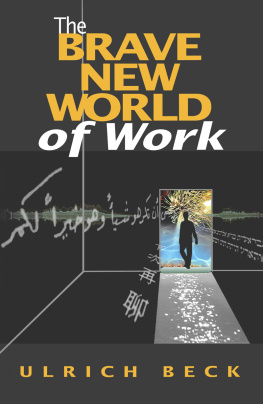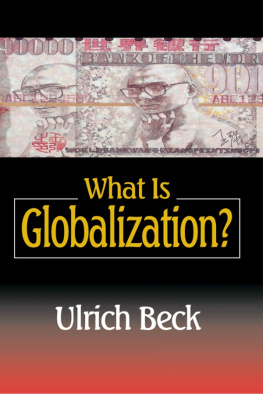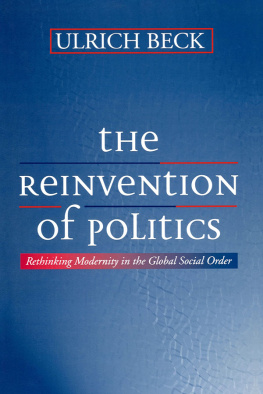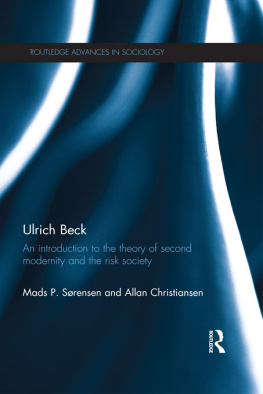
This translation Polity Press 2000. First published in German as Schne neue Arbeitswelt. Vision Weltbrgergesellschaft, Campus Verlag, Frankfurt/New York, 1999.
First published in 2000 by Polity Press in association with Blackwell Publishers Ltd
Published with the assistance of Inter Nationes, Bonn
Editorial office:
Polity Press
65 Bridge Street
Cambridge CB2 1UR, UK
Published in the USA by
Blackwell Publishers Inc.
Commerce Place
350 Main Street
Malden, MA 02148, USA
Marketing and production:
Blackwell Publishers Ltd
108 Cowley Road
Oxford OX4 1JF, UK
All rights reserved. Except for the quotation of short passages for the purposes of criticism and review, no part of this publication may be reproduced, stored in a retrieval system, or transmitted, in any form or by any means, electronic, mechanical, photocopying, recording or otherwise, without the prior permission of the publisher.
Except in the United States of America, this book is sold subject to the condition that it shall not, by way of trade or otherwise, be lent, re-sold, hired out, or otherwise circulated without the publisher's prior consent in any form of binding or cover other than that in which it is published and without a similar condition including this condition being imposed on the subsequent purchaser.
A catalogue record for this book is available from the British Library.
Library of Congress Cataloging-in-Publication Data
Beck, Ulrich, 1944
[Schne neue Arbeitswelt. English]
The brave new world of work / Ulrich Beck ; translated by Patrick Camiller.
p. cm.
Includes bibliographical references and index.
ISBN 0-7456-2397-2 ISBN 0-7456-2398-0 ISBN 978-0-7456-9439-9 (epub) ISBN 978-0-7456-9346-0 (mobi)
1. Labor Social aspects. 2. Work Social aspects. I. Title.
HD4901 .B393 2000
306.36 dc21 99-058486
The Brazilianization of the West
Two Scenarios, One Introduction
The unintended consequence of the neoliberal free-market utopia is a Brazilianization of the West. For trends already visible in world society high unemployment in the countries of Europe, the so-called jobs miracle in the United States, the transition from a work society to a knowledge society do not involve a change only in the content of work. Equally remarkable is the new similarity in how paid work itself is shaping up in the so-called first world and the so-called third world; the spread of temporary and insecure employment, discontinuity and loose informality into Western societies that have hitherto been the bastions of full employment. The social structure in the heartlands of the West is thus coming to resemble the patchwork quilt of the South, characterized by diversity, unclarity and insecurity in people's work and life.
The political economy of insecurity
In a semi-industrialized country such as Brazil, those who depend upon a wage or salary in full-time work represent only a minority of the economically active population; the majority earn their living in more precarious conditions. People are travelling vendors, small retailers or craftworkers, offer all kinds of personal service, or shuttle back and forth between different fields of activity, forms of employment and training. As new developments show in the so-called highly developed economies, this nomadic multi-activity until now mainly a feature of female labour in the West is not a premodern relic but a rapidly spreading variant in the late work-societies, where attractive, highly skilled and well-paid full-time employment is on its way out.
Trends in Germany may stand here for those in other Western societies. In the 1960s only a tenth of employees belonged to this precarious group; by the 1970s the figure had risen to a quarter, and in the late 1990s it is a third. If change continues at this speed and there is much to suggest that it will in another ten years only a half of employees will hold a full-time job for a long period of their lives, and the other half will, so to speak, work la brsilienne.
Here we can see the outlines of what a political economy of insecurity, or a political economy of world risk society, needs to analyse and theorize in greater detail.
- In the political economy of insecurity, the new power game and the new power differential are acted out between territorially fixed political players (governments, parliaments, trade unions) and non-territorially fixed economic players (capital, finance and commerce).
- This creates a well-founded impression that the room for manoeuvre of individual states is limited to the following dilemma: either pay with higher unemployment for levels of poverty that do no more than steadily increase (as in most European countries), or accept spectacular poverty in exchange for a little less unemployment (as in the United States).
- This is bound up with the fact that the work society is coming to an end, as more and more people are ousted by smart technologies. To our counterparts at the end of the 21st century today's struggles over jobs will seem like a fight over deckchairs on the Titanic. The job for life has disappeared. Thus, rising unemployment can no longer be explained in terms of cyclical economic crises; it is due rather to the successes of technologically advanced capitalism. The old arsenal of economic policies cannot deliver results, and all paid work is subject to the threat of replacement.
- The political economy of insecurity therefore has to deal with a domino effect. Those factors which in good times used to complement and reinforce one another full employment, guaranteed pensions, high tax revenue, leeway in public policy are now facing knock-on dangers. Paid employment is becoming precarious; the foundations of the social-welfare state are collapsing; normal life-stories are breaking up into fragments; old age poverty is programmed in advance; and the growing demands on welfare protection cannot be met from the empty coffers of local authorities.
- Labour market flexibility has become a political mantra. The orthodox defensive strategies, then, are themselves thrown onto the defensive. Calls are made everywhere for greater flexibility or, in other words, that employers should be able to fire employees with less difficulty. Flexibility also means a redistribution of risks away from the state and the economy towards the individual. The jobs on offer become short-term and easily terminable (i.e. renewable). And finally, flexibility means: Cheer up, your skills and knowledge are obsolete, and no one can say what you must learn in order to be needed in the future.
The upshot is that the more work relations are deregulated and flexibilized, the faster work society changes into a risk society incalculable both in terms of individual lives and at the level of the state and politics, and the more important it becomes to grasp the political economy of risk in its contradictory consequences for economics, politics and society. Anyway, one future trend is clear. For a majority of people, even in the apparently prosperous middle layers, their basic existence and lifeworld will be marked by endemic insecurity. More and more individuals are encouraged to perform as a Me & Co., selling themselves on the marketplace.
The picture of society thus changes dramatically under the influence of a political economy of insecurity. Extremes of clarity appear in small zones at the very top as well as the very bottom, so low down that it is no longer really a bottom but an outside. But in between, ambivalence is the rule in a welter of jumbled forms. More and more people today live, so to speak, between the categories of poor and rich.
Next page














